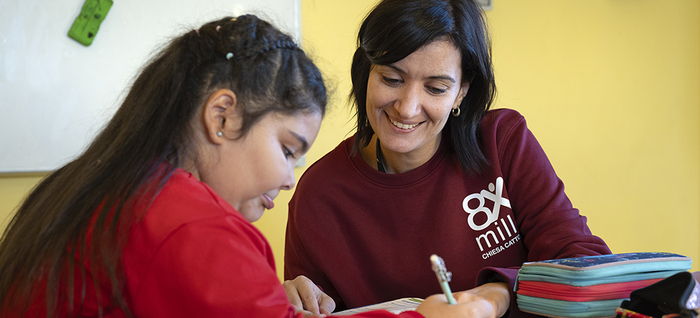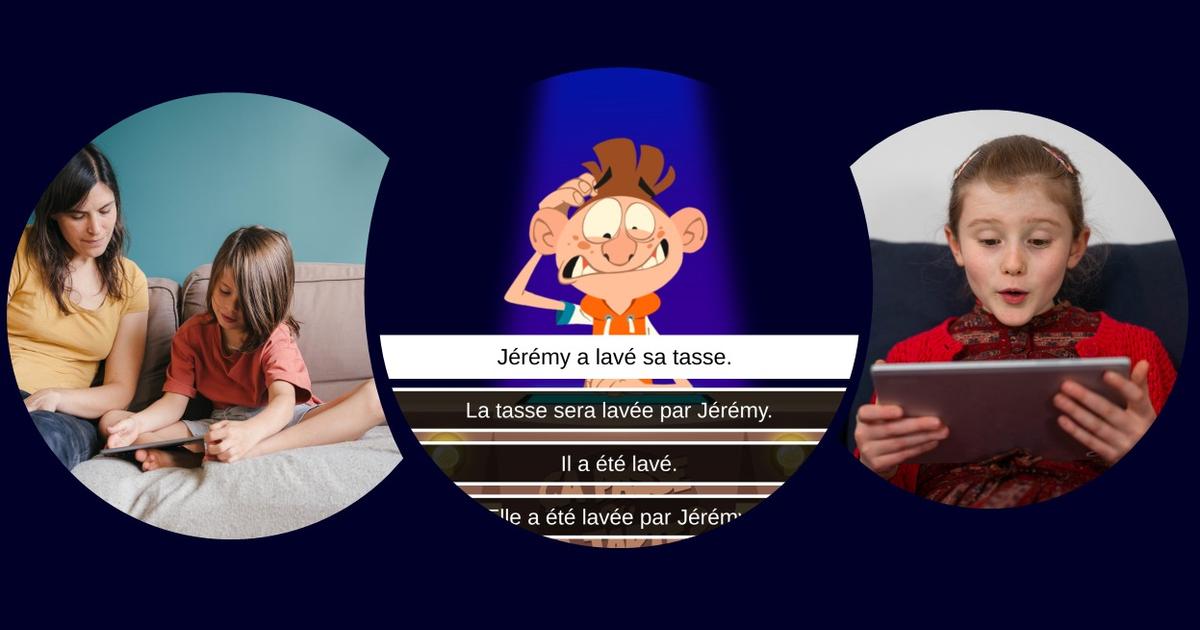That Mukakarisa Vanuncie finds time to go to school, at 46, seems like a miracle. With four children and a grandson to take care of and a niece who is also in her care –“my brother died and she has no one”, she says–, she manages to attend a small and cute classroom in the surrounding area every day. from Nyamirambo, the Muslim neighborhood of Kigali, the capital of Rwanda, where he lives. Vanuncie is learning to read and write here. “I was born in a town in the south of the country, and I grew up with my stepmother. When I was little I could only take care of cattle; It was the only way to survive. I never had the opportunity to go to school,” he confesses.
Almost three out of ten adults cannot read and write in Rwanda.
In addition, despite the fact that the country has experienced a great economic improvement in recent years, 40% of its population still lives below the poverty line.
Reading and writing is something basic to escape from this situation, but not only for that;
the most basic literacy also serves to deal with the routine procedures of life.
Vanuncie explains it this way: “I couldn't even spell my name in Kinyarwanda, the local language.
You have to sign up in a register when meetings are called at the children's school and I always had to ask someone to do it for me.
Now I can, without anyone's help!
And today I also read the street signs.
I find it very useful."
One of Nyamirambo's students comes up to the blackboard.Nyamirambo Women's Center
Vanuncie also says that her children celebrate her learning and often congratulate her.
Now, when the boys come home from school, they can help her with her homework.
Her husband is also enthusiastic.
“I used to run a small stand, but when the pandemic hit I had to close it.
Now we depend on what he earns.
He always says that if he learns more, we might even start another business,” she dreams.
She may be able to get it, although since she started going to school she has not encountered a few obstacles.
First, the coronavirus, which not only killed her little shop, but also closed the classrooms in Rwanda for a few months.
And, after her, that first grandchild whose care took her away from classes for a few weeks.
"Of course I'll keep coming back.
As long as I can, ”she ends.
More than five thousand women
“Since we started with the center, back in 2008, some 5,000 women have passed through them.
At first only they came, but for a few years some men have also come;
in total there are 126″, says Mary Nyangoma, vice president of the Nyamirambo Women's Center, the local NGO that organizes this particular school for adults.
“Many of the older women who live in this neighborhood today were born into families that did not allow their daughters to go to school, so they could not become literate.
It's not like that;
In Rwanda, it is mandatory for all children to go to school, regardless of gender or religion.
So in the next few years we will not see this problem that we do have now,” he explains.
Three out of ten adults cannot read or write in Rwanda, where almost 40% of the population lives in poverty
The case of Rwanda is also exceptional; In few States in the world have women played such an important role as in the recent history of this small country located in the heart of Africa. The majority of the fatalities of the 1994 Tutsi genocide, in which around a million people died, were men, who therefore bore a great responsibility in rebuilding Rwanda as a nation. The successive legal regulations approved since then recognized this. The 1999 inheritance law, which ensured equality between sons and daughters after the death of the parent, or the 2003 Constitution (the first after barbarism), which established the obligation to assign at least 30% of women in all decision charges are two of the clearest examples of this.
These factors have resulted in one of the countries that, on paper, has one of the smallest gender gaps in the world; According to the World Economic Forum, Rwanda ranked fourth in this ranking in 2017, only surpassed by Iceland, Norway and Finland. But, in practice, Rwandan women face daily problems that are specific to and almost exclusive to the female gender in the vast majority of the planet: combining work and housework, caring for children and grandchildren... "We founded the NGO 18 women in 2007 with the objective of empowering ourselves, fighting against gender violence and discrimination. Some of us were single mothers, so we were looking to support each other and our little ones as well. But three of the 18 had never been to school. So we started by teaching them to read and write”,remember Nyangoma.
Professor Narcisse gives a lesson to the students of the Nyamirambo school, in Kigali, Rwanda.Nyamirambo Women's Center
The seed that those 18 pioneers sowed germinated in the aforementioned NGO and in a cooperative of which today 55 registered members are part.
Throughout this time they have been supported by the Ministry of Foreign Affairs of Slovenia, from whom they obtained their first funds, as well as organizations from Puerto Rico and also local authorities.
They used the donations to start projects to be sustainable and independent;
Tourist excursions to different attractions in the neighborhood and the city, Rwandan cooking workshops, a shop where they sell the creations they make with their sewing machines... And the school for adults, more altruistic than the others, but with immense social importance.
many things in the head
“I have never taught children, but I have taught teenagers in secondary school, and I see a big difference. The students who come to this school are here physically, but there are times when their minds are elsewhere. They have to think about many things: the children, the school, the house, the bills at the end of the month…” explains Karamuka Narcisse, a 44-year-old man and a teacher at the Nyamirambo Adult School. And he continues: “Sometimes mothers bring their children because they have no other choice. They are small children who protest, they start to cry… It is really complicated, although I try to help them as much as I can”. And, when asked what her students value most, Narcisse has no doubt: “What they like is learning to write and read; It can change their lives."
Ndabazi Valense is one of those few men who have dared to go to school. This 30-year-old man, married with two children, found a job six months ago with which he earns a good living: he is a security guard. He says that the tragedy took his parents when he was still a child and that this prevented him from going to school. And that he found out very recently about the existence of these classes that he has been attending for a month. “It is very important to know how to read; because of my job they can send me somewhere and I need to understand the papers they give me,” he says. Valense is delighted with the help and understanding he has found in Nyamirambo and in his teacher, and says that his wife, who does have a secondary education, encourages him in what he does. "All this makes me very happy," he confirms.
The covid-19, which has left the country with more than 127,000 positive cases and some 1,400 deaths, stopped the classes of Vanuncie, Valense and the others, and its effects have not allowed the reopening of all of them.
Of the three groups with which the NGO of Nyamirambo usually works, for the moment one has already started up.
“Because of the pandemic, we now have a classroom in operation that 17 people attend daily, but we will resume the others as the virus leaves us,” estimates Vice President Mary Nyangoma.
She then says goodbye to the students and leaves Professor Narcisse to continue those lessons that can change the lives of so many people.
You can follow PLANETA FUTURO on
,
and
, and subscribe
to our 'newsletter'
here
.















